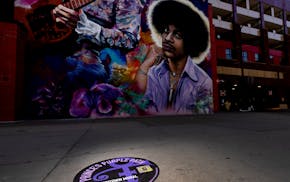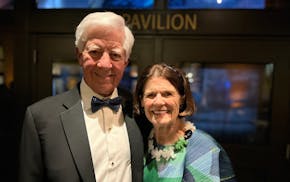Artist and organizer Ricardo Levins Morales might have won the state's most prestigious and biggest cash award, but talk to him about it, and he'll tell you that it's not about him. It's about the people. His art studio in south Minneapolis is overflowing with buttons, posters, 'zines and more designed for liberation workers, unions, organizers, activists and others who seek social change and justice.
"During the last 50 years, my art has consistently been linked to what people are actually doing in communities," Levins Morales said. "And sometimes I'm just telling a story that moves me, but the measure of whether I've done it right is to some degree, to what extent the people who are featured in it utilize the art, take it up, adopt it."
Levins Morales is the recipient of the 2024 McKnight Distinguished Artist Award of $100,000, given annually since 1998 to an artist who has enriched the state's cultural life.
"The McKnight is really about, how is the artist utilizing the power of art to impact community and possibly make significant change?" McKnight panelist and Duluth Art Institute Executive Director Christina Woods said. "Ricardo embodied all of that. It's decades of work, decades of selflessness, and using his art to convey important messages to try and make people's lives better."
Levins Morales, 68, communicates loudly through his art, but his physical presence exudes a quiet and sincere gentleness. He sports a flat cap, thick beard and glasses, and his blue eyes light up when he talks about art and activism. During these warm months, he's often sitting at an outdoor table at Wildflyer Coffee, next door to his artist studio on Minnehaha Avenue.
Art for the people
Even if you've never seen Levins Morales' accessible artwork, filled with people and text and passionately worded slogans and poems mixed with dreamy idealism and calls for social change, you've likely read his words.
"He's the guy who coined the phrase: 'Unions: The Folks That Brought You the Weekend,'" said Peter Rachleff, retired history professor at Macalester College and founding co-executive director of the East Side Freedom Library in St. Paul. "I think a while back he said that that had become his biggest-selling bumper sticker."
Born in Puerto Rico and raised on a farm, he and his family moved to Chicago when he was a teenager. His dad, also an organizer, was starting to get in trouble for his political work. Levins Morales always loved drawing, and his parents always provided him with pencil and paper.
"Which is why my art, if you look at it, you still notice that it's essentially black and white art with the color added," he said.
What he draws is always just want feels important to him. At age 5, he drew chickens because "they were running across our land from the neighbors," he said. Then it was pirates, "because an 8-year-old boy in the Caribbean? Now that's resilience in the face of oppression."
When the family moved to Chicago in 1967, he started looking at political cartoonists and some Puerto Rican artists, copying their styles, reading the radical press and more. He and his sister moved out of their parents' place as teenagers. After brief stints in New Hampshire and Boston, in 1976 he landed in Minneapolis, and in 1979 he and other artists founded Northland Poster Collective, which operated for 30 years.
It was in Minneapolis that he'd eventually meet his future wife, Paula Holden. The couple have two kids, Olivia Levins Holden, a muralist, artist and educator who won a 2022 McKnight Fellowship for Community-Engaged Artists, and son Manuel Levins Holden, a San Diego-based musician whose rap name is Manny Phesto.
Levins Morales felt drawn to the Twin Cities because it seemed relatively clean for U.S. standards. Environmental issues are at the core of his art and activism.
"The work that the Black Panthers and the Young Lords [in Chicago] were doing was all about displacement, which is essentially the pushing out of one 'species' and changing the habitat to make it available to another," he said. "'Species' in quotes."
Veronica Mendez Moore, co-founder and former co-director of Centro de Trabajadores Unidos en la Lucha in Minneapolis, had seen Levins Morales' work around for years before he worked on the organization's flagship campaign in November 2014. He came in and met with workers, creating art and visuals that spoke directly to those involved. He also cut through the in-the-moment push to organize.
"He's so rooted in that this struggle is for the long haul, and that we need to really think about it as our life's work," Mendez Moore said.
For other colleagues like Rachleff — who has known Levins Morales since the mid-'80s, when they got connected during the Hormel strike, one of the longest strikes in Minnesota labor history — it's about the art.
"I think that Ricardo really stands for the value of art in inspiring people toward progressive social change," he said. "It's not art for art's sake. It's art to inspire."

Minneapolis native Evren Ozel advances to finals of Van Cliburn International Piano Competition

How many of Minneapolis' new 'Purple Path' sidewalk signs for Prince fans can you find?
![Pepe Willie stood for a portrait outside the Capri Theater, which is undergoing a major renovation, in Minneapolis. ] Shari L. Gross • shari.gross@s](https://arc.stimg.co/startribunemedia/4TPIVGPZLESDCIL3ZJ4J4T4ZDU.jpg?h=91&w=145&fit=crop&bg=999&crop=faces)
Pepé Willie, mentor to Prince and Morris Day, dies at 76

Your ultimate guide to eating and drinking in downtown St. Paul

